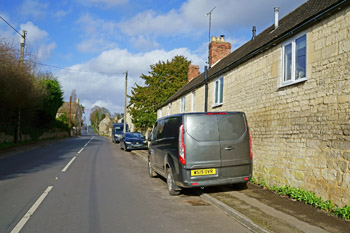The Department for Transport (DfT) has published a consultation setting out three options to tackle the issue of pavement parking.
Officials said parking on pavements disproportionately affects people with visual or mobility impairments, those assisted by guide dogs, and wheelchair and mobility scooter users.
However, they added that ‘there is still a major role for cars and other private vehicles, so any future plans will need to take this into consideration’.
The three options proposed in the consultation are: improving the traffic regulation order process to make it easier for councils to prohibit pavement parking in their areas; giving councils powers to fine drivers who park on paths; and a London-style nationwide ban on pavement parking.

Painswick, Gloucestershire, 12 March 2020
Transport secretary Grant Shapps said: ‘Parking on pavements means wheelchair users, visually impaired people and parents with pushchairs can be forced into the road, which is not only dangerous but discourages people from making journeys.
‘A key part of our green, post-COVID recovery will be encouraging more people to choose active travel, such as walking, so it is vital that we make the nation’s pavements accessible for everyone.’
Officials said pavement parking presents a clear safety risk when parked cars occupy the pavement and force vulnerable pedestrians to move into the road, adding that disabled people say pavement parking is a significant barrier to carrying out daily journeys.
Recent research from the charity Guide Dogs shows that 32% of people with vision impairments and 48% of wheelchair users were less willing to go out on their own because of pavement parking.
Blanche Shackleton, head of policy, public affairs and campaigns at Guide Dogs, said: ‘For many people with sight loss, cars and vans parked on the pavement make our streets stressful and dangerous to navigate. At any time, you might be forced out into the road with traffic that you cannot see.
‘When every journey is an ordeal, simply going out independently can become daunting.’
The DfT said that as many streets were built decades and centuries before the high levels of vehicles currently on roads, any measures will need to ensure the free flow of traffic and access for the emergency services.
Cllr David Renard, the Local Government Associations’s transport spokesman, said: 'Pavement parking and damaged pavements is one of the biggest complaints from pedestrians – and not just in London.
'The LGA has long-called for the ban on pavement parking to be extended to all areas of England, with councils able to make exemptions, so we are pleased government has launched this consultation.
'Councils share the Government’s aim to promote active travel and this measure should make walking more attractive and safer for everyone, including vulnerable users.'
Register now for full access
Register just once to get unrestricted, real-time coverage of the issues and challenges facing UK transport and highways engineers.
Full website content includes the latest news, exclusive commentary from leading industry figures and detailed topical analysis of the highways, transportation, environment and place-shaping sectors.
Use the link below to register your details for full, free access.
Already a registered? Login